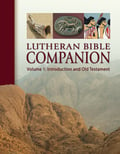God speaks through Malachi to rebuke His people for their unrighteousness, specifically the priests for their failure to fulfill their duties and to those marrying foreign idolatrous spouses. The Lord makes clear the Day of Judgment is coming and he wants His people to be prepared. The following is adapted from the Lutheran Bible Companion.
Author
Surprisingly, the first question about the Book of Malachi is whether we even know its author’s name. Virtually without exception, critics believe that the superscription (assumed to be an editorial addition) mistakenly coined the name on the basis of Mal 3:1, where God promises to send “My messenger” (“Malachi” in Hebrew; the word might also be translated, “My angel”). Presumably, the book’s editor identified this figure with the prophet himself, either taking “My messenger” to be his personal name, or understanding it as applying to his ministry.
The arguments against “Malachi” as a proper noun are both text-critical and based on the name’s meaning. For one thing, the name Malachi (or its full form Malachiah) is not found elsewhere in the Old Testament and other early Hebrew writings. It is often argued that use of so singular a name would be especially unlikely in the postexilic period when the Hebrew mal’ak was increasingly used for “angel,” and at a time when the interest in angels was becoming increasingly prominent.
The text-critical evidence, at best, points to ancient uncertainty about
the name. The Septuagint took malachi to mean “by the hand of His messenger” (though it does entitle the book Malakias or Malachi). The Aramaic Targum added further opinion and identified the author with Ezra: “by the hand of my messenger, whose name is called Ezra the scribe.” Jerome, probably due to his training under rabbis, accepted the tradition that Ezra was the author. Other rabbinic traditions, however, described Malachi with a Levitical genealogy.
Despite all this, the Book of Malachi undeniably bears the stamp of one individual personality. The balance of probability would seem to favor “Malachi” as a proper noun, but grounds are lacking to dismiss the other possibility out of hand. In any event, following universal convention on both sides, we shall speak of “Malachi” as the personal name of the author of the last book in the Minor Prophets.
Purpose
Malachi’s predominant concern was with the purity and correct execution of the temple worship. The three main abuses that concern Malachi are: (1) the degeneracy and lassitude of the priesthood; (2) intermarriage with pagan women and often heartless divorce of their first partners; and (3) the
congregation’s failure to pay the sacred dues, to the detriment of especially
the Levites. The first three oracles (chs 1–2) concentrate more exclusively on
current problems in the community, while the remainder of the book looks forward to future events and the end times.
Genre
The form of Malachi is different from most of the other prophetic books. Rather than recording a series of oracles or discourses it presents and answers rhetorical questions. It is arranged in six speeches or oracles, each introduced by this standard pattern: (1) Yahweh or the prophet first advances an argument; (2) a challenge or question is uttered by the people or the priest; (3) a defense by Yahweh, sometimes in words of reproach and doom.
This style has caused some interpreters to argue that Malachi committed his ideas to writing from the outset. Some assert that the spirit of the legalist, catechist, and scribe is supposedly beginning to quench the spirit of prophecy. Even more negatively, some, who note (correctly) that Malachi’s method anticipates a method common among the rabbis and in the Talmud, characterize him as a scholastic rabbi. These opinions fail to appreciate the
prophet’s style. Although his writing lacks the poetry of earlier prophets, it does not lack in powerful teaching.
Specific Law Themes
The Book opens with a harsh statement, “Esau I have hated” (1:3), intended to illustrate the depth of God’s love and choice for Israel. No matter how one translates or interprets the statement, it remains one of the harshest in the entire Bible. From this point, Malachi turns back to Israel’s priests, who serve closest to God’s nearer presence at the temple. He takes the Lord’s chosen ones to task for their unfaithfulness on the heels of His rejection of Esau/Edom. He adds to their offenses a series of practical issues: divorce, unfaithfulness in offerings, etc., and closes by announcing the day of the Lord’s return in judgment.
Specific Gospel Themes
Just as Malachi opens harshly against Esau/Edom, he opens with words of love and faithfulness for Israel. While calling Israel to repentance, he reminds them that the Lord will be feared (i.e., trusted) not only in Israel but also among the nations (1:14). God is a Father to His people, not a distant creator or heartless judge (2:10). To restore the people He prepares a messenger—fulfilled in the person of John the Baptist. What is more, He will send the “sun of righteousness” (4:2), who cannot forget His people (3:16).
Text adapted from the Lutheran Bible Companion, Volume 1: Introduction and Old Testament (pp. 998–1002) © 2018 CPH. All rights reserved.
 To learn more about Malachi read the Lutheran Bible Companion.
To learn more about Malachi read the Lutheran Bible Companion.
























